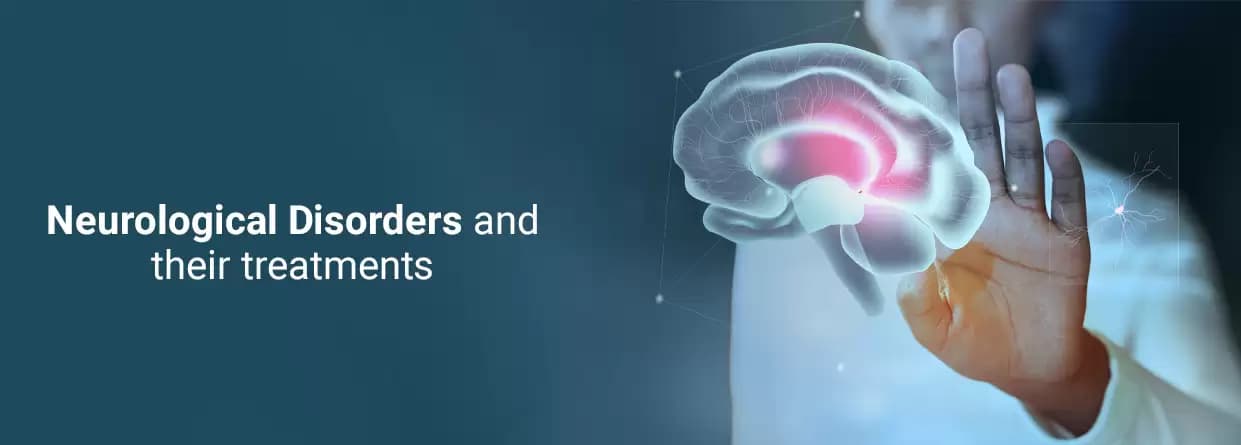
Neurological disorders are medical conditions which affect the brain and central and autonomic nervous systems. Common causes of neurological disorders often include structural, biochemical and electrical abnormalities in the brain, spinal cord, and other nerves which can result in a range of symptoms of neurological disorders.
Neurological disorders are medical conditions that affect the brain and central and autonomic nervous systems. Common causes of neurological disorders often include structural, biochemical, and electrical abnormalities in the brain, spinal cord, and other nerves which can result in a range of symptoms of neurological disorders. There are different conditions that fall under the category of neurological disorders depending on the cause and origin of the condition.
These disorders can affect people of all ages and sexes. Prolonging the treatment can lead to an increased risk of permanent deformity and memory loss, which can affect the overall health of the individual. If you or your loved ones are experiencing early symptoms of neurological disorders, this blog can provide a reference for learning about the different types and how to manage them. However, it is recommended that you consult the neurologist expert in Kolkata for an accurate diagnosis and comprehensive treatment.
Neurological disorder symptoms can vary from one individual to another depending on the type of disorder, and the specific area affected. One of the apparent signs indicates emotional symptoms, including mood swings, sudden outbursts, delusions, depression, etc. However, it is only after a comprehensive diagnosis, that doctors can associate these symptoms with neurological disorders.
In some instances, if the individual experiences physical symptoms due to neurological disorders, the doctor may look for partial or complete paralysis, muscle weakness, severe loss of sensations, seizures, difficulty reading and writing, poor cognitive abilities, unexplained pain, and decreased alertness. Seek immediate help right away if you notice these symptoms in yourself or someone close to you.
The most neurological disorder causes are unknown, but people with a history of brain injury or trauma are considered high-risk factors for such medical conditions. Depending on the patient’s health, lifestyle, etc. causes of such dysfunctions can be diverse. Our brain and spinal cord contain numerous membranes which can malfunction due to injury, trauma, or congenital defects.
Congenital disorders of the nervous system are often a result of genetic mutation. Similarly, a patient is at an increased risk of neurological disorders due to damage to the peripheral nerves located deep under the skin. Additionally, neurological disorders can result from a number of causes, such as -
While there are more than 600 neurological disorders according to renowned neurologists across the world, there are some common types of neurological conditions that are prevalent in the majority of the population. Here are some of the common types of neurological disorders -
1. Alzheimer's disease: A progressive and irreversible brain disorder that affects memory, thinking, and behavior.
2. Parkinson's disease: A degenerative disorder that affects movement, causing tremors, stiffness, and difficulty with coordination and balance.
3. Multiple sclerosis (MS): A chronic disease that affects the central nervous system, causing a range of symptoms such as vision problems, muscle weakness, and difficulty with coordination and balance.
4. Epilepsy: A neurological disorder that causes seizures, which can range from mild to severe.
5. Migraines: A type of headache that is often accompanied by nausea, vomiting, and sensitivity to light and sound.
6. Amyotrophic lateral sclerosis (ALS): A progressive and fatal disease that affects nerve cells in the brain and spinal cord, causing muscle weakness and paralysis.
7. Huntington's disease: A genetic disorder that causes a progressive deterioration of brain cells, leading to movement, cognitive, and psychiatric problems.
8. Traumatic brain injury (TBI): A brain injury that occurs as a result of a blow or jolt to the head, causing a range of symptoms from mild to severe.
9. Cerebral palsy: A group of disorders that affect movement and coordination, often caused by damage to the brain during or shortly after birth.
10. Tourette syndrome: A neurological disorder that causes repetitive, involuntary movements and vocalizations called tics.
Neurological disorders treatment options depend on the type of specific condition and its severity. The doctor may recommend different treatment options based on the diagnosis for the best outcome. Consulting a healthcare professional at the early stages of the condition can increase the effectiveness of the condition and ensure proper management of neurological disorders. Here are some common treatment options which can help manage symptoms of neurological disorders -
Neurological disabilities include a wide range of medical conditions associated with the brain such as epilepsy, learning disabilities, neuromuscular disorders, autism, ADD, brain tumors, cerebral palsy, etc. While some neurological disorders are congenital (present at birth), others may be acquired due to any injury, trauma, tumors, degeneration, infections, etc. Such conditions can pose great harm to the individual as well as to the people around them.
Most people confuse mental disorders with neurological conditions. Mental disorders are psychiatric illnesses or diseases which are primarily abnormalities related to our thought, feeling, or behavior. Mental disorders produce distress or impairment of function which is why it is crucial to get an early diagnosis and personalized care.
Yes, autism is a neurological and developmental disorder that affects how people interact with others. It also affects their communication, learning, and behavior.
Yes, cervical dystonia, is a neurological disorder that causes the neck muscles to contract involuntarily, making your head twist or turn to one side.
Dyslexia is a learning disability that is neurological in origin. The condition makes it difficult to accurately and fluently recognize words and the ability to decode.
Written and Verified by:

Dr. Mahendra Kumar Manocha is a Consultant in Neuro Medicine Dept. at CMRI, Kolkata, with over 25 years of experience. He specializes in diagnosing and treating neurological disorders, including epilepsy, stroke, and multiple sclerosis.
Similar Neuro Sciences Blogs
Book Your Appointment TODAY
© 2024 CMRI Kolkata. All Rights Reserved.